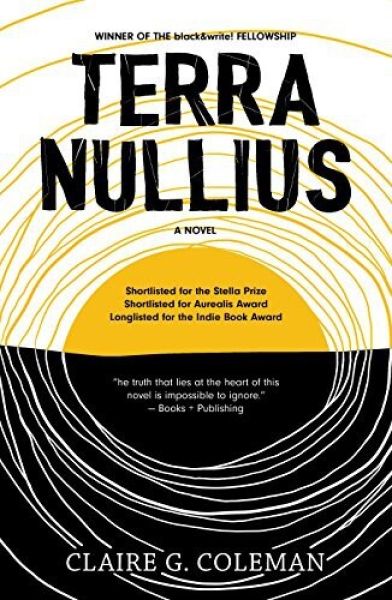The Nights of Wild Distress
Terra Nullius
By Claire Coleman

10 Dec, 2021
Claire Coleman’s 2017 Terra Nullius is settler science fiction.
In the land Europeans called Australia, Jacky flees in a bid to escape rural slavery at the hands of the Settlers. Not only is this unacceptable because Jacky’s flight denies the Settlers the fruits of his labour. It is unacceptable because if Jacky succeeds in escaping the life specified for him by the Settlers, other Natives might follow his example.
Jacky’s odds of escaping are dismal. They are not helped by the fact Jacky has no idea where exactly he is going.
There’s no way to discuss this without a fairly large spoiler.
Jacky was appropriated as a child and raised under the mindful eye of Sister Bagra. He is destined to work until he drops or dies from one of Sister Bagra’s chastisements. If he were to know where he came from or who his family was would only be a distraction. Thus he was never told.
Jacky can read Settler to a degree. A daring raid on a records repository gives him a general idea where he might head: Jerramungup, which Jacky adopts as his non-Settler-imposed surname. Jacky heads into the wilderness, painfully aware of the natural and Settler hazards between him and Jerramungup.
Sister Bagra has her own problems. Her years of service transforming the disgusting Native children into marginally useful servants for Settlers has been rewarded with an anonymous complaint that she is a cog in a continent-wide slavery network and that further, many of the children’s deaths officially attributed to disease or starvation were in fact murder at the good sister’s hands. A senior church functionary is on his way to investigate.
It is true that Sister Bagra has killed quite a number of Native children in her day. It is also true that she routinely falsifies documents to conceal their true cause of their deaths. However, she only does this for the greater good. It’s not really a lie if the truth is inconvenient.
Unluckily for Jacky, his flight into the wilderness becomes an important facet in a crisis that sweeps Australia and the rest of Settler — or as the oppressed humans call their alien overlords, “Toad” — occupied Earth. The consequences for the handful of humans remaining on the planet are potentially vast. The consequences for Jacky almost certainly dire.
~oOo~
The revelation that the story is not about British-occupied Australia, but extra-terrestrial occupied Australia, comes 40% of the way through the book (OK, 42% but who cares about 2%?). It’s a big reveal but it’s next to impossible to discuss the book without revealing that detail.
The Toads took enough notice of humans to shut down all of what humans thought was advanced technology. After that, humans were dismissed as bright animals, to be exterminated as convenient and the survivors used as uncompensated labour. Very few Toads on Earth regard humans as people or our activities prior to the Toads descending on us as civilization1. Among the many consequences of this: the Settlers are convinced what they are doing to humans isn’t slavery because humans are animals and not people. Slavery is illegal but the treatment of Natives is merely domestication of a convenient species.
Some readers may notice parallels between how Toads treat humans in general and how Europeans — especially the British — treated Australian Aborigines. In fact, readers would be hard pressed not to do so because the author goes to great lengths to ensure that the parallels are clear. Some readers might object that it should be perfectly obvious to the Toads that humans are people and that the Toad behavior towards humans makes it clear they are being willfully obtuse on this point. Because, of course, it is economically convenient to the aliens to be so. That’s true but there is ample historical precedent for it2.
Claire G. Coleman is a Noongar woman and her perspective on Australia’s history is that of someone whose people got colonized, rather than those who colonized. Thus, the plot does not necessarily go in the direction many readers would expect. Readers may find the ultimate destination the book reaches disappointing and unsatisfactory but, again, real-world examples abound.
Coleman’s prose is functional, her characters variously sympathetic or monstrous. The novel is in no way subtle but no doubt if it was many of the audience would miss the point. It’s not a happy book but then—Little House on the Prairie aside — stories about appropriating other people’s land shouldn’t be.
Terra Nullius is available here (Amazon US), here (Amazon Canada), here (Amazon UK), here (Barnes & Noble), here (Book Depository), and here (Chapters-Indigo).
1: One of the little twists in Toad-human relations is that once they have burned human cities off the map and reduced the species to a small number of terrorized refugees, the Toads have developed a taste for human art, something with no analog in Toad culture. Unfortunately, having discovered a possible export for Earth they realized most human art was inadvertently incinerated with most humans, and the scrabbling survivors have no time or cultural context to create the art the aliens covet.
2: Not every Toad thinks of humans as animals. However, the few that don’t, aren’t numerous or powerful enough to matter.
